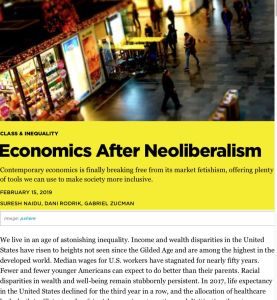
Suresh Naidu, Dani Rodrik and Gabriel Zucman
Economics After Neoliberalism
Contemporary economics is finally breaking free from its market fetishism, offering plenty of tools we can use to make society more inclusive.
Boston Review, 2019
What's inside?
Modern economics needs a fresh way of thinking to address inequality and improve prosperity.
Recommendation
Economists Suresh Naidu, Dani Rodrik and Gabriel Zucman survey the policy recommendations of members of the Economics for Inclusive Prosperity (EfIP) group, a coalition of academics seeking a fresh vision for the dismal science. Their study finds that, by rejecting long-held beliefs and focusing on equality, economists can offer more suitable policy recommendations. This thought-provoking report concludes that to achieve “inclusive prosperity,” economics must embrace ideas that correct the power imbalances present in markets and society.
Take-Aways
- Wealth inequality in the United States is reaching crisis levels, but economics can help solve the problem.
- The discipline should contribute to ensuring “inclusive prosperity,” which encompasses nonmonetary aspects of well-being, such as health and civil rights.
- The use of “wage boards” to establish minimum pay according to industry, occupation and region could considerably reduce wage disparities.
- Multinationals, which can exploit global discrepancies in laws to redistribute profits to less-taxed regions, should pay taxes where they sell their goods.
- Policies that aim to reduce inequality are beneficial both in terms of wealth distribution and economic performance.
Summary
Wealth inequality in the United States is reaching crisis levels, but economics can help solve the problem. The discipline should contribute to ensuring “inclusive prosperity,” which encompasses nonmonetary aspects of well-being, such as health and civil rights. The goal of the Economics for Inclusive Prosperity (EfIP) group is to create alternatives to existing economic policies that rely solely on market mechanisms. Although economists tend to favor market-based solutions, policy prescriptions have in the past been inadequate, because they relied too much on strict assumptions. Nevertheless, new research makes it harder for economists to overlook data that seem at odds with their theories. Though economics may not be able to provide precise answers, it can shed light on the possible trade-offs among alternative policies.
“We live in an age of astonishing inequality. Income and wealth disparities in the United States have risen to heights not seen since the Gilded Age.”
Members of EfIP realize that markets are imperfect and that fundamental economic changes must take place in the United States. Their recommendations aim to enhance both efficiency and equality in a world of market failures, notably in the realms of labor, credit, insurance and innovation. They also address the role of governments and imbalances in power.
“Economics’ “recent empirical bent makes it more difficult to idolize markets because it makes it more difficult to ignore inconvenient facts.”
One proposal involves using “wage boards,” currently in place in Australia, to establish minimum wages according to industry, occupation and region rather than setting a one-size-fits-all pay minimum. This could reduce wage disparities. Other ideas focus on capital and risk. Inequality and capital flows from nations with an abundance of oil have boosted savings and maintained unnaturally low interest rates, leading to higher systemic risk. Banks hold too much debt and so face a great threat of bankruptcy. In this light, markets require robust regulation, particularly on credit contracts and capital requirements for banks. Multinationals, which can exploit global discrepancies in laws to redistribute profits to less-taxed regions, should pay taxes where they sell their goods.
“Economics can help build a society that is both fairer and does more to live up to its productive potential.”
A consistent theme of EfIP’s research is the influence of power imbalances on the economy. Policies that aim to reduce inequality are beneficial both in terms of wealth distribution and economic performance. As such, modern economics has a role to play in the creation of a fairer society, one that welcomes inclusive prosperity.
About the Authors
Suresh Naidu, Dani Rodrik and Gabriel Zucman are professors at Columbia University, Harvard University, and the University of California, Berkeley, respectively.
This document is restricted to personal use only.
My Highlights
Did you like this summary?
Read the articleThis summary has been shared with you by getAbstract.
We find, rate and summarize relevant knowledge to help people make better decisions in business and in their private lives.
Already a customer? Log in here.



























Comment on this summary